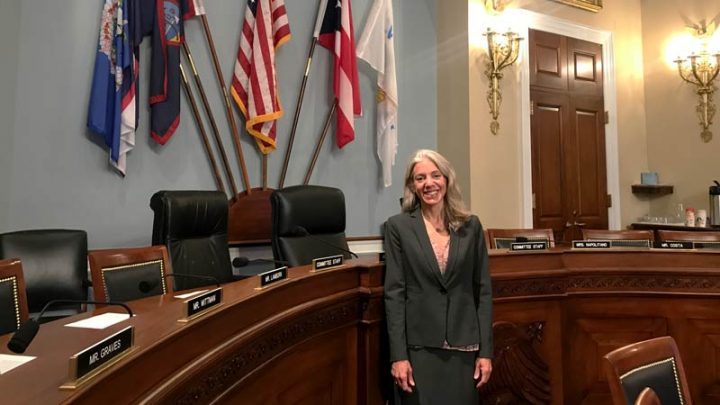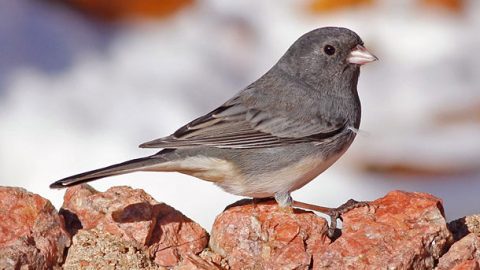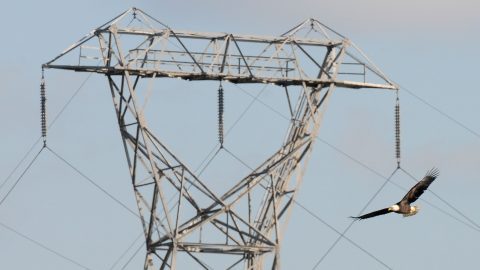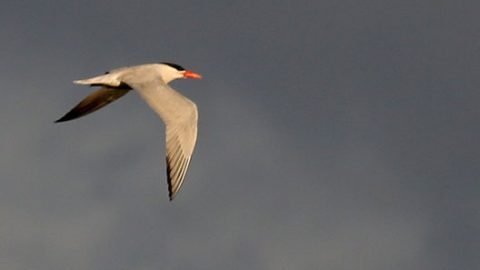Defending the Migratory Bird Treaty Act and Clean Water: Our Conservation Science Director Testifies to Congress
By Winny Sun
June 18, 2019
Amanda Rodewald, senior director of conservation science at the Cornell Lab of Ornithology, was at the nation’s Capitol last week to defend two core conservation policies at risk of reinterpretation and weakening by the current presidential administration.
On Thursday June 13, Rodewald testified before the House Subcommittee on Water, Oceans, and Wildlife to speak against the Trump administration’s proposed reinterpretation of the Migratory Bird Treaty Act (MBTA). The treaty between the U.S. and Canada was ratified by Congress in 1918, and another version of the MBTA was signed between the U.S. and Mexico 20 years later. The act forbids both the purposeful and the incidental killing of a wide range of migratory birds. In December 2017, the Interior Department, under the Trump administration, issued a memorandum that sought to reinterpret the MBTA’s applicability in cases of incidental take.
“The exclusion of incidental take renders the [MBTA] impotent on most sources of mortality for migratory birds and eliminates a powerful incentive for industry,” Rodewald said at the House hearing.
Under the reinterpretation, companies that unintentionally kill birds (“incidental take”) would no longer be liable for the deaths they caused. In 2010, the Deepwater Horizon oil spill killed more than a million birds, for which the British oil company BP paid more than $100 million—funds that were used to restore damaged Gulf coastlines and bird habitat. But under this reinterpretation, companies like BP that kill birds due to negligence would no longer be subject to penalties.
“This proposed reinterpretation is inconsistent with previous administrations of Republicans and Democrats alike,” Rodewald said, noting that presidents from both parties have consistently used the incidental-take provisions of the MBTA as incentives for companies to reduce their harm to birds.
More on the Migratory Bird Treaty Act
Rodewald stated that incidental take from industry accounts for upwards of 1.1 billion bird mortalities each year. She cited examples from the Nixon, George W. Bush, and Obama administrations of the U.S. Fish and Wildlife Service working with power companies to avoid bird electrocutions and collisions and reduce the more than 30 million birds killed by power lines annually.
“I am not arguing that we should try to eliminate all human-caused mortality of birds,” Rodewald said. “But we can and should take active steps to reduce harm where possible, and the MBTA helps us to do that.”
Earlier in the week, Rodewald coauthored an opinion article with scientists from Ohio State University and the University of South Florida that argued against another Trump administration reinterpretation—the proposed rollback of the Waters of the US (WOTUS) rule.
“The proposed rule does not reflect the best-available science and, if enacted, will damage our nation’s water resources,” the authors wrote in Proceedings of the National Academy of Sciences of the U.S.A.
The proposed rule will weaken the Clean Water Act protections for one-fifth of streams in the U.S. and over half of wetlands, leaving millions of miles of streams and over 16 million acres of wetlands more vulnerable to pollution.
According to Rodewald and coauthors, the proposed rule eliminates “protection for all ephemeral streams and non-floodplain wetlands, irrespective of connectivity and the consequences for downstream waters.
“The current administration’s proposed rule at once contradicts both the rich body of evidence about water connectivity and the clearly articulated mandate of the Clean Water Act.”
The Clean Water Act of 1972 states a clear mandate “to restore and maintain the chemical, physical, and biological integrity of the Nation’s waters,” and over nearly five decades it has invested more than $1 trillion in reducing water pollution in the U.S.
“The apparent opposition to enacting science-based policies undermines decades of efforts—and investments by tax-paying Americans— to clean and protect our nation’s waters,” Rodewald and her coauthors wrote. “Every nation’s citizens need clean water to be healthy and productive—today and into the future.”
Winny Sun’s work on this story was made possible by the Cornell Lab of Ornithology Science Communication Fund, with support from Jay Branegan (Cornell ’72) and Stefania Pittaluga.

All About Birds
is a free resource
Available for everyone,
funded by donors like you
American Kestrel by Blair Dudeck / Macaulay Library



